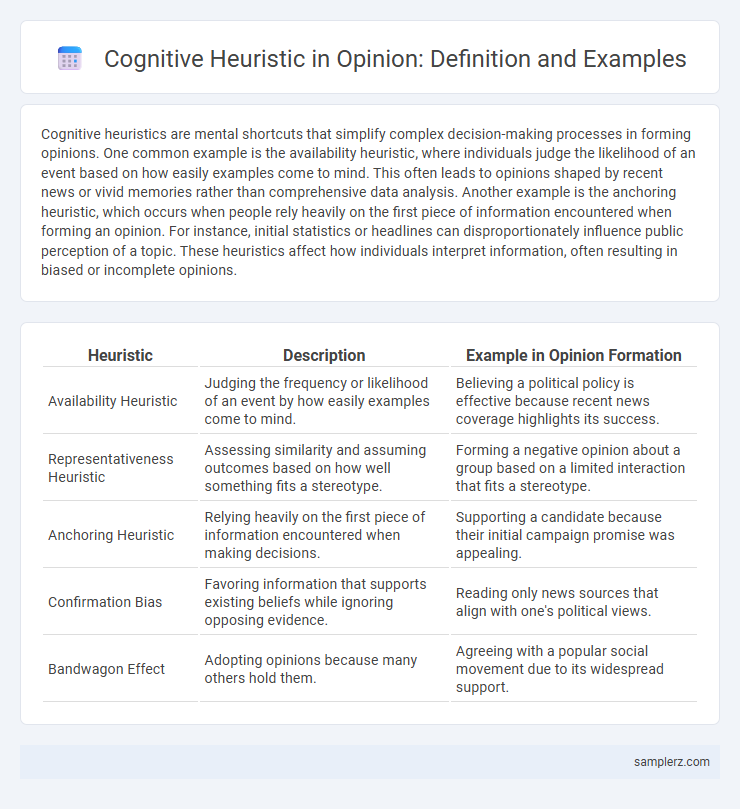Cognitive heuristics are mental shortcuts that simplify complex decision-making processes in forming opinions. One common example is the availability heuristic, where individuals judge the likelihood of an event based on how easily examples come to mind. This often leads to opinions shaped by recent news or vivid memories rather than comprehensive data analysis. Another example is the anchoring heuristic, which occurs when people rely heavily on the first piece of information encountered when forming an opinion. For instance, initial statistics or headlines can disproportionately influence public perception of a topic. These heuristics affect how individuals interpret information, often resulting in biased or incomplete opinions.
Table of Comparison
| Heuristic | Description | Example in Opinion Formation |
|---|---|---|
| Availability Heuristic | Judging the frequency or likelihood of an event by how easily examples come to mind. | Believing a political policy is effective because recent news coverage highlights its success. |
| Representativeness Heuristic | Assessing similarity and assuming outcomes based on how well something fits a stereotype. | Forming a negative opinion about a group based on a limited interaction that fits a stereotype. |
| Anchoring Heuristic | Relying heavily on the first piece of information encountered when making decisions. | Supporting a candidate because their initial campaign promise was appealing. |
| Confirmation Bias | Favoring information that supports existing beliefs while ignoring opposing evidence. | Reading only news sources that align with one's political views. |
| Bandwagon Effect | Adopting opinions because many others hold them. | Agreeing with a popular social movement due to its widespread support. |
How Cognitive Heuristics Shape Personal Opinions
Cognitive heuristics, such as the availability heuristic, influence how individuals form personal opinions by relying on readily accessible information rather than exhaustive analysis. This mental shortcut causes people to overemphasize recent or memorable events, skewing perceptions and judgments. Confirmation bias also plays a crucial role, leading individuals to favor information that aligns with their existing beliefs, reinforcing and shaping their opinions over time.
Anchoring Bias: Influencing Our Initial Judgments
Anchoring bias strongly impacts opinion formation by causing individuals to rely heavily on the first piece of information encountered, such as an initial price or statistic, which then shapes all subsequent judgments. This cognitive heuristic can lead to distorted opinions, as new information is often interpreted in relation to the anchored reference point, limiting objective evaluation. Studies show that when initial anchors are manipulated, people's opinions and decision-making processes are predictably skewed, demonstrating the powerful influence of anchoring bias.
Availability Heuristic: Opinion Formation Through Recent Events
The availability heuristic shapes opinions by making individuals rely on recent or easily recalled events when forming judgments, often amplifying perceived risks or benefits. For example, after extensive media coverage of airplane accidents, people may overestimate the danger of flying despite statistical evidence of its safety. This mental shortcut highlights how memory accessibility influences opinion formation, sometimes leading to biased or disproportionate responses to current events.
Confirmation Bias: Seeking Information That Supports Our Views
Confirmation bias influences opinion formation by driving individuals to prioritize information that aligns with their preexisting beliefs, often disregarding contradictory evidence. This cognitive heuristic reinforces existing viewpoints, making people more resistant to change and fostering echo chambers. Studies reveal that exposure to confirming information strengthens neural pathways associated with reward, explaining the persistence of biased opinion sharing.
Representativeness Heuristic: Categorizing Opinions Quickly
The Representativeness Heuristic influences opinion formation by causing individuals to categorize complex information based on perceived similarities to known prototypes, often leading to snap judgments that ignore base rates or statistical reality. For example, when evaluating political candidates, voters may quickly associate certain traits with party stereotypes, biasing their opinions without thorough analysis. This cognitive shortcut streamlines decision-making but risks oversimplification and perpetuation of stereotypes in public discourse.
The Impact of Framing Effects on Decision-Making
Framing effects significantly influence decision-making by shaping how individuals interpret information and assess risks, often leading to biased judgments based on presentation rather than content. For example, people are more likely to choose a medical treatment described with a "90% survival rate" rather than a "10% mortality rate," despite both conveying the same statistics. This cognitive heuristic demonstrates how subtle shifts in framing can alter preferences and opinions, highlighting the importance of critical evaluation in opinion formation.
Overconfidence Bias in Opinion Expression
Overconfidence bias in opinion expression often leads individuals to overestimate the accuracy of their judgments, resulting in overly assertive statements despite limited evidence. This heuristic causes people to discount alternative viewpoints and ignore contradictory information, reinforcing entrenched beliefs. Studies show that overconfident opinions can hinder constructive dialogue and increase polarization in social and political contexts.
Stereotyping: Cognitive Shortcuts in Social Judgments
Stereotyping serves as a cognitive shortcut in social judgments, enabling individuals to quickly categorize others based on perceived group traits, which often leads to oversimplified and biased opinions. This heuristic reduces cognitive load by relying on generalized assumptions, yet it can perpetuate misjudgments and reinforce social prejudices. Understanding the role of stereotyping in opinion formation highlights the challenges of overcoming implicit biases in interpersonal evaluations.
The Role of Affect Heuristic in Emotional Opinions
The affect heuristic significantly influences emotional opinions by allowing individuals to rely on their immediate feelings when evaluating information, often bypassing analytical reasoning. This cognitive shortcut leads to rapid judgments based on positive or negative emotions tied to an issue rather than objective evidence. The strength of emotional reactions can skew perception, reinforcing biased opinions and impacting decision-making processes in social and political contexts.
Bandwagon Effect: Adopting Popular Beliefs Easily
The Bandwagon Effect illustrates a cognitive heuristic where individuals adopt popular beliefs without critical evaluation, driven by social conformity and the desire to fit in. This heuristic significantly influences opinion formation, as people tend to align their views with majority opinions, often disregarding personal judgment or factual evidence. Such behavior can lead to widespread acceptance of ideas based solely on their popularity rather than their accuracy or validity.

example of cognitive heuristic in opinion Infographic
 samplerz.com
samplerz.com